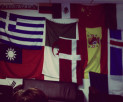International grant
In Groningen, there’s one group who’s there for all other student groups: CUOS, the Central Executive Board for Student Organisations. They provide support for obtaining funding and guidance on housing matters. For the past five years, the group has also offered a grant for international student organisations in particular.
Effectively, the International grant spells out a bigger budget for international groups to host their events. The goal is to get more students involved in extracurricular activities and to further support internationalisation.
CUOS serves as an intermediary between the Board of Directors of the RUG and all student organisations, and they are the ones who determine whether groups that apply for the International grant meet the requirements.
How to apply
Groups have to meet certain criteria to be eligible. First and foremost, they must be registered as either a foundation (stichting) or a society (vereniging) at the Chamber of Commerce (Kamer van Koophandel or KvK), according to Matthijs Katz, chairman of CUOS.
The maximum grant they can apply for is 1,000 euros, but how much they receive depends on what activities they offer and how many people attend them, Matthijs says.
Only those that host enough activities will receive the grant. ‘They should have an annual budget and an annual plan,’ Matthijs says. ‘Organisations have to prove that they will use this money wisely.’
Once a year
Organisations must be managed by students and open to all university students, not only those affiliated with a specific faculty, political party or religion.
‘Organisations have to prove that they will use this money wisely’
International student organisations can apply throughout the year according to their needs but can only receive the International grant once a year. If a group is awarded funding, they also have to file a financial report at the end of the year showing where and how it was spent.
Matthijs says that CUOS plans to host a meeting this month for organisations in the GISP – Groningen International Student Platform – network to inform them about the grant and how to apply for it.
Spreading the word about the grant is needed: so far, only a couple of groups have made use of it at all. Those who have can attest that applying is pretty quick and painless. The Indian student organization – GISA – applied for the International grant last April and received 750 euros in June. ‘I was quite happy with that. We just filled in a form,’ says Jasmine Tomar, current president of GISA.
Bollywood nights
Throughout the year, the group hosts events such as Indian holiday celebrations and Bollywood dance nights, and Jasmine says the grant should help GISA to make entrance to their activities more affordable. ‘We are a student organisation, so the lower the ticket price is, the better,’ she adds.
‘The lower the ticket price is, the better’
The grant helps make that goal more attainable, but Jasmine still hopes the funding will increase in the future: the group spends roughly 5,000 euros every year on activities.
In August 2015, the Groningen University Turkish Student Association (GUTSA) also changed its status and became an official student association after registering at the Chamber of Commerce (KVK), according to Turhan Gul, chairman of GUTSA.
That made them eligible for the grant, and they received 550 euros from CUOS last year. However, the money wound up being used to cover their registration expenses. The group plans to re-apply for the International grant this year.
Official recognition
As part of the university’s ongoing internationalisation efforts, Rieza Aprianto, a member of the Personnel faction of the University Council, wants international groups to be officially recognised by the RUG as well.
‘We believe that if a university has international aspirations and wants to attract as many international students as possible, international student organisations should be incorporated into the system’, Aprianto says.
GISA is one of the few groups that have acquired official status so far. ‘It is very important for us’, Jasmine says. ‘Due to our legal status, it is easier to advertise our events since the university is supporting us’. Their status also permits the group to use space at the university for a nominal fee.
The first step
However, being officially recognised by the university has even more benefits beyond the campus. Jasmine says that a letter signed by RUG president Sibrand Poppema helped GISA obtain permission from the municipality of Groningen to use the Stadspark as a venue for their Festival of Colours event this year, which was attended by 120 people.
Following a recent discussion with the Board of the University about the matter, Aprianto says university leadership has agreed to facilitate international student organizations – so long as they ask for assistance. ‘Associations need to make the first step,’ Aprianto adds.








